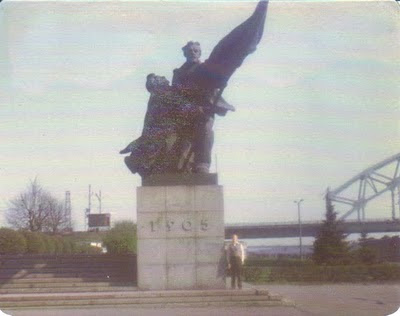Mine is not a story labelled war, but it was war, make no mistake. My information has been based on my grandfather Victor's memorable stories and the reports from a researcher in Riga. I've removed a portrait photograph from this version of the post about Otto Freibergs, because of mistaken identity. Since then? I’ve been able to add more details for the family history, thanks to Antra and the wonderful Raduraksti
Otto Freibergs of Kalna Koneni on the Marzingshof estate married Ilse Indriksons of the Vatrāne estate on 25 January 1881 in the church at nearby Suntaži. (3) One wealthy landlord owned both estates, from whom Otto’s father had been allowed to buy a farm he called Koneni, near Kastrāne village. Entries in the church registers describe or address Otto as “landowner” (Grundbesitzer; the registers are in the German language). Otto himself had a few tenant farmers.
Freibergs Farmhouse, Kastrāne, Latvia ca. 1920s (Otto's son Rudolf and famly); BDM collection.
The general protests against oppression did not sit well with the often-absentee landlords and their representatives. They met the growing demands "with bullets and whips" as Grandpa related. In December of 1905 Otto was elected head of the Kastrane parish executive, a reform committee. The committee seized control of parish funds, to the fury of the estate owners and the Lutheran pastor who condoned their restrictive measures. The committee's first agenda was to pay salaries to school teachers, establish the right for all citizens to hold bank accounts, and allow the population to buy firewood to heat their homes from the deeply wooded baronial estates.
While this effort was underway, others were more demonstrative in their protests. The Freedom Fighters and mežabrāli (forest brothers, or resistance)—hiding in and emerging from the forests—retaliated against brute force by burning estate manor houses and fighting their enforcers. Otto's two sons played some unstated, perhaps peripheral, part. In turn, the landlords had police or soldiers at their beck and call who enjoyed shooting suspected revolutionaries and torching homes. Neighbours began to suspect Tsarist informers amongst themselves. The revenge cycle of violence and fear continued with shootings, murder, and fire.
Attempts to work within the system had no more effect than violent means. Otto’s personal convictions led to his death, sadly like so many others. The 1905 Book of Remembrance and a court file preserved in the Latvia State Historical Archives verify and clarify the family story.(4) Otto’s son Rudolf testified that the chief of police of Riga District, called Von Ksaver, was under heavy pressure by trustees of the Vatrāne estate to issue the order for Otto’s arrest. On 4 February 1906, Otto was seized from his home where he was sick in bed, taken to Madliena (about ten miles away) and shot. His terrified wife was left to make arrangements to bring the body home. Son Victor (1884-1978) followed family advice and fled the country, never to return; son Rudolf (1886-1943) left in 1907 and returned about 1922.
Ilse (Indriksons) Freibergs and daughter Milda (1893-??) pose for a family portrait. The man may be son Rudolf or possibly the father Otto. If Milda was age 12 (1905) or younger, her father was still alive. BDM family collection.
Inevitably, Imperial troops were sent to brutally quash the 1905 Revolution. Thousands of Latvians were killed, imprisoned, or forced to emigrate during “the summer of graveyards 1906.”(5) The events, bad as they were, were but a precursor to the devastation of the First World War and the War of Liberation that followed. The attempted reforms did not see the light of day until 1920 when a liberal majority was elected to a parliamentary government.
Monument to the 1905 Freedom Fighters, Riga, Latvia; photograph 1972, HFD.
(1) Lutheran church register (Mālpils, Latvia), 1855; Latvia State Historical Archives (LSHA) 235, apraksts 4, lieta 1750.
(2) Aleksandrs Feigmanis, “Genealogical Report: Research About Freiberg Family,” p. 4, citing “Kastrāne, Mežabrāļi Kastrānes Pagasta,” Latvijas Revolucionārio Cīnītāju Plemiņas Grāmata, (Riga: Avots, 1983), 37-38; report and photocopies to author, 16 May 2007. The information was submitted by Otto’s son Rudolf in 1933. The title is loosely translated as Book of Remembrance or Memory Book, dedicated to the 1905 freedom fighters, notably those who died, and was first published in 1933.
(3) Lutheran church register (Suntaži, Latvia),1881; LSHA 235-7-792.
(4) Feigmanis, “Genealogical Report,” pp. 3-4, citing Riga District Court file “Re: Andrey Graudin, Andrey Lielmezh and Peter Riekstin, started 1909”; LSHA 115-11-2589.
(5) “The New Current and the Revolution of 1905,” Latvian Institute (http://www.li.lv/) : accessed 31 January 2010).






1 comment:
What a great post. It's not a period in history you hear a lot about, and because it is not labelled as a war, it's often forgotten, I think. You did a great job describing this historical period through one family's life.
Post a Comment